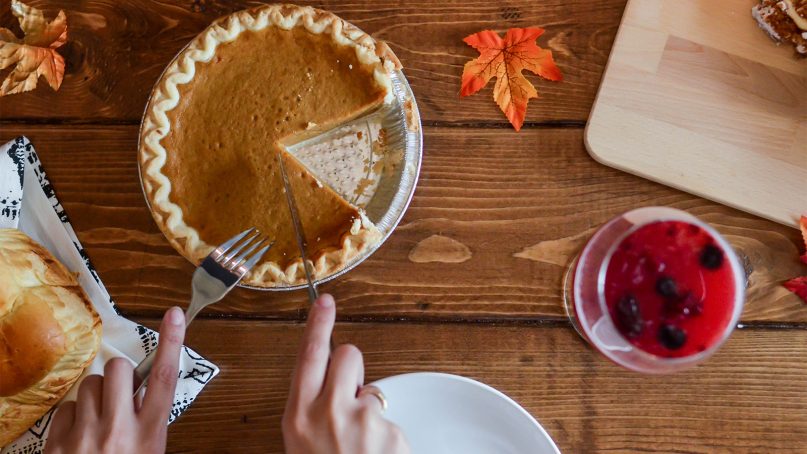(RNS) — More than 54 million people are expected to travel this Thanksgiving week. Many of them will be going home; many will be welcomed into other people’s homes and find traditions, foods and flavors they’ve never encountered before. Though we celebrate all we are grateful for on Thanksgiving, encounters with other families and other faiths have been a key ingredient at the table.
The nation’s most religiously diverse areas are Brooklyn and Queens, New York; the Maryland suburbs of Washington, D.C.; and Navajo County, Arizona, according to the Public Religion Research Institute. But across the entire country, 4 in 10 American adults no longer practice the same religion as Mom or Dad. If they grew up Catholic, the odds are even higher they’ve made a switch.
Any married couples on your guest list? Nearly 40% of Americans who married after 2010 are in religiously mixed marriages. That includes the second family: Vice President Kamala Harris identifies as a Christian who was raised in a Hindu and Christian household; in 2014 she married Doug Emhoff, who is Jewish.
Laurie Patton, president of Middlebury College in Vermont and a professor of religion, shares a Thanksgiving meal with Unitarians, nones, Jews and Greek Orthodox. “A fun group!” she wrote in an email.
RELATED: On a second COVID-19 Thanksgiving, how to find room for thanks
“We were all raised Unitarian, which teaches an appreciation of and engagement with many different faiths,” wrote Patton. “My 89-year-old parents remain Unitarian, although neither are able to attend church. My mother is more pro-Unitarian than my father, a retired surgeon who would have been more comfortable as a ‘None.’”
The Rev. Fred Davie, a Presbyterian minister and senior strategic adviser to the president of Union Theological Seminary, wrote: “My plans are to have Thanksgiving dinner with my husband, Michael, and four friends. I am the only practicing person of faith. My husband and two of our friends are culturally Christian but consider themselves to be agnostic. Another friend, culturally Jewish, is an atheist and he is married to someone who is spiritually fluid, as he was born to a nominally Buddhist dad and practicing Christian mom.”
“We will give thanks at dinner,” Davie says, “but not in any tradition. And we will acknowledge the dubious history of the holiday while embracing a ritual of gratitude.”
Over the past few years, the old adage about not discussing religion and politics in company has become as much a survival strategy as a matter of etiquette. But veterans of religiously diverse Thanksgiving tables say that inviting guests to share the stories of their own faiths (not their opinions of others) is not only a gesture of inclusion and hospitality but a balm to division.
“Sharing stories is such a powerful way for us to get to know one another,” said Salma Hasan Ali, a Muslim writer who lives in Washington, D.C., and founded a popular blog about gratitude that attracts people of different faiths.
Studies show that American religious diversity will only continue to grow and that Thanksgiving dinners of the future will continue to reflect this “potluck nation,” in the words of Inerfaith Youth Core founder and president Eboo Patel. We all bring something special to the table.
The spirit of Thanksgiving, indeed, can happen whenever and wherever America’s diverse community is re-created — even where there is no table at all.
Three years ago, when Dr. Anu Gorukanti, now a pediatric hospitalist at Santa Clara Valley Medical Center in San Jose, California, and her physician husband were in the throes of their residency training, they decided to forgo a traditional dinner and family on Thanksgiving and instead flew to South America to hike the Incan Trail, high in the Andes.
For Gorukanti, who grew up Hindu and Indian American in Alabama, home to some of the least religiously diverse counties in the nation, it was one of the most reaffirming Thanksgivings of her life.
“The most meaningful part of the hike were the connections we made hiking alongside people from all over the world,” Gorukanti wrote in an email. “We met people who dreamt of hiking Machu Picchu for years and others whose life had taken an unexpected detour for them end up there,” she said.
“I felt a deep sense of community in these brief moments of connection with strangers, a healing antidote to the suffering and disconnection that I felt in my job. It reminded me that the world is so much bigger than we realize — that in every small town in this world, there are people navigating love, loss, and connection. And that is something I am grateful for.”
(Monique Parsons is a religion reporter based in Chicago and managing editor of Interfaith America, a media site sponsored by Interfaith Youth Core. The views expressed in this commentary do not necessarily reflect those of Religion News Service.)





